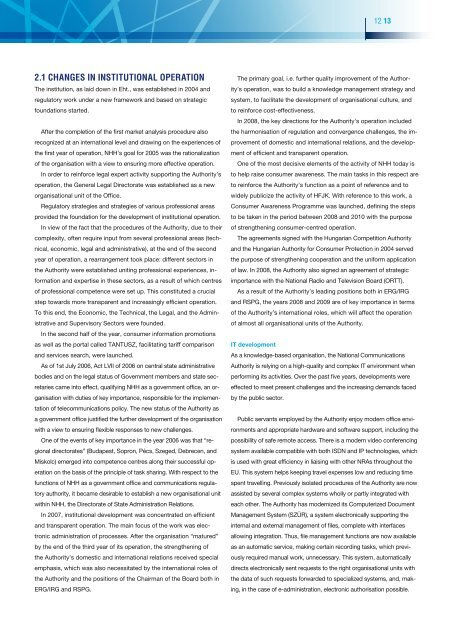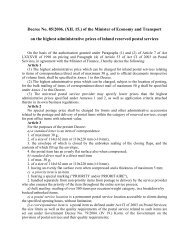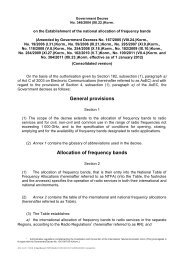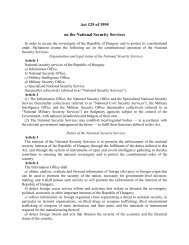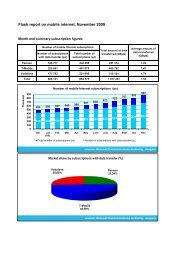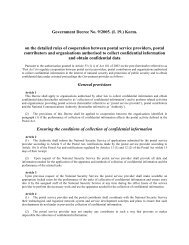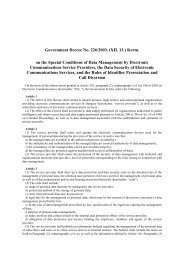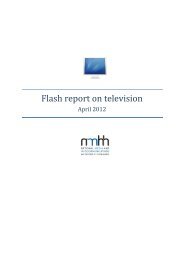The Hungarian Communications Market Developments and ...
The Hungarian Communications Market Developments and ...
The Hungarian Communications Market Developments and ...
Create successful ePaper yourself
Turn your PDF publications into a flip-book with our unique Google optimized e-Paper software.
12 13<br />
2.1 Changes in institutional operation<br />
<strong>The</strong> institution, as laid down in Eht., was established in 2004 <strong>and</strong><br />
regulatory work under a new framework <strong>and</strong> based on strategic<br />
foundations started.<br />
After the completion of the first market analysis procedure also<br />
recognized at an international level <strong>and</strong> drawing on the experiences of<br />
the first year of operation, NHH’s goal for 2005 was the rationalization<br />
of the organisation with a view to ensuring more effective operation.<br />
In order to reinforce legal expert activity supporting the Authority’s<br />
operation, the General Legal Directorate was established as a new<br />
organisational unit of the Office.<br />
Regulatory strategies <strong>and</strong> strategies of various professional areas<br />
provided the foundation for the development of institutional operation.<br />
In view of the fact that the procedures of the Authority, due to their<br />
complexity, often require input from several professional areas (technical,<br />
economic, legal <strong>and</strong> administrative), at the end of the second<br />
year of operation, a rearrangement took place: different sectors in<br />
the Authority were established uniting professional experiences, information<br />
<strong>and</strong> expertise in these sectors, as a result of which centres<br />
of professional competence were set up. This constituted a crucial<br />
step towards more transparent <strong>and</strong> increasingly efficient operation.<br />
To this end, the Economic, the Technical, the Legal, <strong>and</strong> the Administrative<br />
<strong>and</strong> Supervisory Sectors were founded.<br />
In the second half of the year, consumer information promotions<br />
as well as the portal called TANTUSZ, facilitating tariff comparison<br />
<strong>and</strong> services search, were launched.<br />
As of 1st July 2006, Act LVII of 2006 on central state administrative<br />
bodies <strong>and</strong> on the legal status of Government members <strong>and</strong> state secretaries<br />
came into effect, qualifying NHH as a government office, an organisation<br />
with duties of key importance, responsible for the implementation<br />
of telecommunications policy. <strong>The</strong> new status of the Authority as<br />
a government office justified the further development of the organisation<br />
with a view to ensuring flexible responses to new challenges.<br />
One of the events of key importance in the year 2006 was that “regional<br />
directorates” (Budapest, Sopron, Pécs, Szeged, Debrecen, <strong>and</strong><br />
Miskolc) emerged into competence centres along their successful operation<br />
on the basis of the principle of task sharing. With respect to the<br />
functions of NHH as a government office <strong>and</strong> communications regulatory<br />
authority, it became desirable to establish a new organisational unit<br />
within NHH, the Directorate of State Administration Relations.<br />
In 2007, institutional development was concentrated on efficient<br />
<strong>and</strong> transparent operation. <strong>The</strong> main focus of the work was electronic<br />
administration of processes. After the organisation “matured”<br />
by the end of the third year of its operation, the strengthening of<br />
the Authority’s domestic <strong>and</strong> international relations received special<br />
emphasis, which was also necessitated by the international roles of<br />
the Authority <strong>and</strong> the positions of the Chairman of the Board both in<br />
ERG/IRG <strong>and</strong> RSPG.<br />
<strong>The</strong> primary goal, i.e. further quality improvement of the Authority’s<br />
operation, was to build a knowledge management strategy <strong>and</strong><br />
system, to facilitate the development of organisational culture, <strong>and</strong><br />
to reinforce cost-effectiveness.<br />
In 2008, the key directions for the Authority’s operation included<br />
the harmonisation of regulation <strong>and</strong> convergence challenges, the improvement<br />
of domestic <strong>and</strong> international relations, <strong>and</strong> the development<br />
of efficient <strong>and</strong> transparent operation.<br />
One of the most decisive elements of the activity of NHH today is<br />
to help raise consumer awareness. <strong>The</strong> main tasks in this respect are<br />
to reinforce the Authority’s function as a point of reference <strong>and</strong> to<br />
widely publicize the activity of HFJK. With reference to this work, a<br />
Consumer Awareness Programme was launched, defining the steps<br />
to be taken in the period between 2008 <strong>and</strong> 2010 with the purpose<br />
of strengthening consumer-centred operation.<br />
<strong>The</strong> agreements signed with the <strong>Hungarian</strong> Competition Authority<br />
<strong>and</strong> the <strong>Hungarian</strong> Authority for Consumer Protection in 2004 served<br />
the purpose of strengthening cooperation <strong>and</strong> the uniform application<br />
of law. In 2008, the Authority also signed an agreement of strategic<br />
importance with the National Radio <strong>and</strong> Television Board (ORTT).<br />
As a result of the Authority’s leading positions both in ERG/IRG<br />
<strong>and</strong> RSPG, the years 2008 <strong>and</strong> 2009 are of key importance in terms<br />
of the Authority’s international roles, which will affect the operation<br />
of almost all organisational units of the Authority.<br />
IT development<br />
As a knowledge-based organisation, the National <strong>Communications</strong><br />
Authority is relying on a high-quality <strong>and</strong> complex IT environment when<br />
performing its activities. Over the past five years, developments were<br />
effected to meet present challenges <strong>and</strong> the increasing dem<strong>and</strong>s faced<br />
by the public sector.<br />
Public servants employed by the Authority enjoy modern office environments<br />
<strong>and</strong> appropriate hardware <strong>and</strong> software support, including the<br />
possibility of safe remote access. <strong>The</strong>re is a modern video conferencing<br />
system available compatible with both ISDN <strong>and</strong> IP technologies, which<br />
is used with great efficiency in liaising with other NRAs throughout the<br />
EU. This system helps keeping travel expenses low <strong>and</strong> reducing time<br />
spent travelling. Previously isolated procedures of the Authority are now<br />
assisted by several complex systems wholly or partly integrated with<br />
each other. <strong>The</strong> Authority has modernized its Computerized Document<br />
Management System (SZÜR), a system electronically supporting the<br />
internal <strong>and</strong> external management of files, complete with interfaces<br />
allowing integration. Thus, file management functions are now available<br />
as an automatic service, making certain recording tasks, which previously<br />
required manual work, unnecessary. This system, automatically<br />
directs electronically sent requests to the right organisational units with<br />
the data of such requests forwarded to specialized systems, <strong>and</strong>, making,<br />
in the case of e-administration, electronic authorisation possible.


